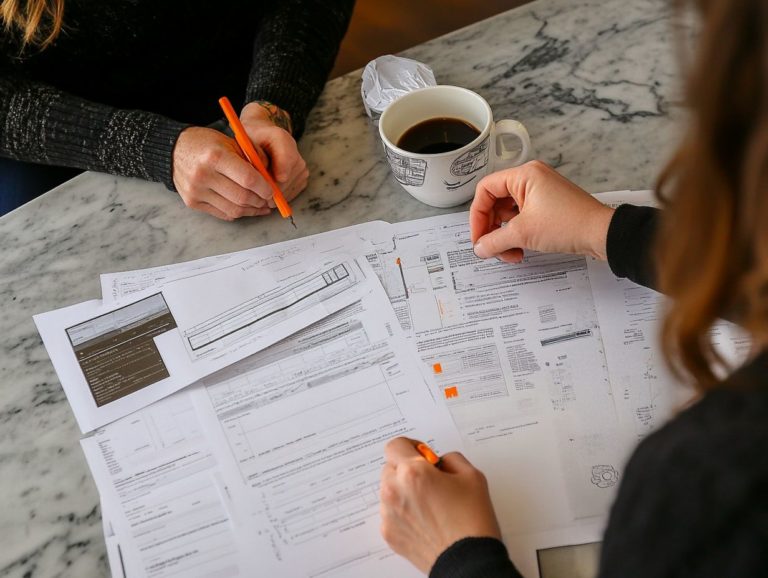How to Start the Home Buying Process?
Buying a home is undoubtedly one of life’s most significant decisions, and embarking on this journey starts with meticulous planning.
This guide illuminates the essential steps of the home buying process, guiding you from understanding your budget all the way to closing the deal.
You’ll discover how to calculate what you can afford, select the perfect neighborhood, find a trustworthy real estate agent, negotiate like a pro, and navigate inspections and the closing process with ease.
Whether you re venturing into homeownership for the first time or looking to make a strategic move, this information empowers you to tackle the process with unwavering confidence.
Contents
- Key Takeaways:
- The Importance of Planning
- Understanding Your Budget
- Researching and Choosing a Neighborhood
- Finding the Right Real Estate Agent
- Negotiating and Making an Offer
- The Home Inspection Process
- Get Ready to Close on Your New Home!
- Frequently Asked Questions
- What are the first steps I need to take to start the home buying process?
- What is the best way to find a real estate agent?
- How important is it to get a home inspection?
- What documents do I need to prepare for the home buying process?
- Can I negotiate the purchase price of a home?
- Do I need to have a lawyer when buying a home?
Key Takeaways:

- Great planning is your secret weapon for a smooth home buying adventure.
- Calculate your budget and stick to it.
- Choose a neighborhood carefully, considering factors like safety, school districts, and amenities.
- Finding the right real estate agent can make all the difference.
- Negotiate and make a competitive offer with the help of your agent.
- Understand the home inspection process and prepare accordingly.
- When closing on your new home, make sure to have all necessary documents and information ready.
The Importance of Planning
Planning is an essential step in your homeownership journey, setting the stage for successfully navigating the intricate homebuying process. This includes grasping mortgage rates, establishing a realistic housing budget, and securing that all-important pre-approval letter.
By assessing your financial readiness and weighing factors like closing costs and the current state of the real estate market, you can formulate a strategy that paves the way for a smoother transition into homeownership.
A solid plan prepares you to tackle challenges head-on, such as fluctuating mortgage rates and unforeseen expenses, transforming the experience into something rewarding rather than stressful.
Why Planning is Key to a Successful Home Buying Process
Effective planning is essential for your homebuying journey. It empowers you to assess your financial readiness and explore the best mortgage options available, whether that s FHA loans or conventional loans.
By establishing a well-thought-out budget, you can pinpoint your price range and avoid the temptation to overspend. Understanding your credit score is crucial, as it plays a direct role in determining mortgage rates and terms. A strong credit score can unlock more favorable conditions, making it vital for you to check your score and address any discrepancies before diving into the application process.
Don t underestimate the importance of selecting the right mortgage lenders. Taking the time to research lenders that align with your financial situation and requirements can streamline the borrowing process significantly.
Ultimately, effective planning lays the groundwork for making informed decisions throughout this significant investment journey.
Understanding Your Budget
Understanding your budget is essential for successfully navigating the housing market and making informed decisions when you decide to purchase a home. This involves assessing how much you can allocate for a down payment, estimating closing costs, and factoring in ongoing expenses such as property taxes and mortgage rates.
By having a clear grasp of your financial landscape, you position yourself to make choices that align with your financial goals and aspirations.
Calculating Affordability and Setting a Budget
Calculating affordability is an essential step when establishing your housing budget, as it ensures that your financial readiness aligns with current mortgage rates and your credit score.
To determine how much you can comfortably spend on a home, start by assessing your total monthly income. This should encompass all sources, including your salary, bonuses, and any rental income you might have.
Next, consider your debt-to-income ratio, which shows how much of your income goes to paying off existing debts, such as student loans and credit cards. By keeping this ratio manageable ideally below 43% you can avoid stretching your finances too thin.
Don t forget that fluctuating mortgage rates can affect your monthly payments, ultimately influencing what you can afford in the housing market.
At this point, it’s time to take action! Assess your budget, check your credit score, and start researching mortgage options to prepare for your exciting home buying adventure!
Researching and Choosing a Neighborhood

Researching and selecting a neighborhood is an important step in your home-buying journey. It significantly influences property values, community safety, and access to amenities.
Understanding the dynamics of the housing market in your chosen area is crucial to making an informed decision that aligns with your lifestyle and investment goals.
Factors to Consider When Choosing a Neighborhood
When selecting a neighborhood, carefully consider several key factors, including school districts, available amenities, overall safety, and current property values. These elements can significantly impact your enjoyment of the area and the long-term financial benefits of homeownership.
High-quality school districts often attract families, which drives demand for homes and enhances property values. Neighborhoods with plenty of amenities like parks, shopping centers, and restaurants are particularly appealing. Safety is also important; a neighborhood with low crime rates instills confidence and attracts more buyers, ultimately leading to appreciation in property values over time.
By understanding how these factors contribute to desirability, you can make informed decisions that align with your lifestyle and financial aspirations.
Finding the Right Real Estate Agent
Choosing the right real estate agent can make your homebuying adventure smooth and enjoyable!
These professionals offer great market expertise, negotiation skills, and insights that empower you to navigate the intricate landscape of purchasing a home.
Qualities to Look for in a Real Estate Agent
When you’re choosing a real estate agent, it’s important to consider several key qualities: negotiation skills, market expertise, and effective communication. These attributes play a significant role in your homebuying journey.
A proficient agent not only shares information clearly but also listens closely to your needs and concerns, ensuring that every detail is addressed. Their responsiveness to your inquiries can greatly reduce the stress that often accompanies property transactions.
Accessing client testimonials can offer valuable insights into an agent’s track record, highlighting their reliability and commitment. The ability to build strong relationships grounded in trust and open dialogue enhances your experience, leaving a lasting impression for both buyers and sellers.
Negotiating and Making an Offer
Negotiate effectively and craft an irresistible offer to secure your dream home quickly! This process is essential in the homebuying journey and demands a sharp awareness of current market conditions and a thoughtful strategy for presenting earnest money, which is a deposit made to show the seller you are serious about buying the home.
Tips for Negotiating and Making a Competitive Offer

To successfully negotiate and craft a competitive offer, consider employing effective strategies like understanding the seller’s motivations, presenting earnest money to showcase your seriousness, and remaining flexible with your terms.
Recognizing what drives a seller s decision can significantly elevate your negotiation strategy. For instance, if the seller needs a quick sale due to a job relocation or family situation, framing your offer to align with their timeline can prove advantageous.
Building rapport with the seller is also essential; cultivating a good relationship can foster a more favorable negotiation atmosphere. Always be ready to compromise, as demonstrating flexibility can make your offer more enticing.
The Home Inspection Process
The home inspection process is a critical milestone in your homebuying journey. It thoroughly evaluates the property’s condition and provides invaluable insights through a detailed inspection report.
This report can become a powerful tool for negotiation, helping you address potential repairs with confidence.
What to Expect and How to Prepare for a Home Inspection
When preparing for a home inspection, it s essential to grasp what to expect and how to get your property ready for evaluation. Having an inspection checklist at your fingertips can make a world of difference.
This checklist acts as a valuable tool, allowing you to identify potential issues before the inspector arrives think plumbing leaks, electrical glitches, or roof damage that could raise some serious red flags.
Take the time to declutter your spaces, ensuring that key areas like the attic, basement, and various rooms are easily accessible for a thorough examination.
As the inspection unfolds, anticipate a comprehensive evaluation of your property s condition, including safety concerns and compliance with local codes.
Once the inspection wraps up, understanding the report is crucial; it will typically highlight major defects, potential repairs, and necessary maintenance. This insight gives you the power to make informed decisions about how to address any findings and safeguard your investment.
Get Ready to Close on Your New Home!
Closing on your new home marks the ultimate milestone in your homebuying journey. This crucial step includes closing costs, paperwork finalization, and working with mortgage lenders.
Each of these elements is vital to ensuring a seamless transition into homeownership.
Understanding the Closing Process and What to Bring
Understanding the closing process is crucial for a successful transaction. It encompasses specific closing costs and required documents you will need to finalize your journey to homeownership.
During this pivotal phase, you’ll typically encounter several essential documents, including the purchase agreement, title insurance, and the mortgage note each one vital for verifying the sale’s details.
It’s equally important to prepare for various costs, such as closing fees, home inspection charges, and property taxes, which can add up significantly.
To ensure a seamless closing experience, consider conducting a final walkthrough of the property to confirm that all agreed-upon repairs have been completed. Get an estimate of closing costs from your lender ahead of time. This helps you avoid surprises and ensures a smooth transition into your new home.
Frequently Asked Questions

What are the first steps I need to take to start the home buying process?
The first step to starting the home buying process is to determine your budget and get pre-approved for a mortgage. This will help you understand your purchasing power and give you a clear idea of what you can afford. Additionally, research neighborhoods you are interested in, and consider reviewing understanding the home buying process for new buyers as you start saving for a down payment and closing costs.
What is the best way to find a real estate agent?
The best way to find a real estate agent is through referrals from friends, family, or acquaintances who have recently gone through the home buying process. You can also search online for local agents and read reviews from past clients. It’s important to find an agent who is experienced and knowledgeable about the local market.
How important is it to get a home inspection?
Getting a home inspection is an essential step in the home buying process. It can uncover any potential issues with the property that may not be visible to the naked eye. This can save you money and help you negotiate repairs or adjustments to the purchase price. Hiring a licensed, experienced home inspector is a must! This ensures your inspection is thorough and accurate.
What documents do I need to prepare for the home buying process?
Some documents you will need to prepare include proof of income, bank statements, tax returns, and identification. If you are getting a mortgage, you will also need to provide financial information such as credit score, debt-to-income ratio, and employment history. Your lender and real estate agent will guide you on the specific documents required for your situation.
Can I negotiate the purchase price of a home?
Yes, you can negotiate the purchase price of a home. Your real estate agent can assist you in determining a fair market value for the property and help you make an offer based on that.
You can also negotiate based on any necessary repairs or updates needed for the home. Keep in mind that the seller may also negotiate, so be prepared to discuss and compromise.
Do I need to have a lawyer when buying a home?
While it is not a requirement, it’s a smart move to have a lawyer when buying a home. A lawyer who specializes in real estate can review all legal documents and contracts and ensure that all necessary steps are taken.
They protect your interests throughout the transaction and provide valuable advice on legal matters related to the home purchase.






